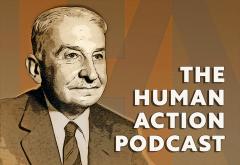Allen Mendenhall joins the show to expand last week’s discussion on the intellectual state of America. Are we living in a decidedly anti-intellectual age, or has America always been predisposed toward doers over thinkers? Have Americans simply stopped reading books? Have we lost our ability to think deeply, due to the constant distractions of the digital age? And what does the shift away from any shared baseline cultural knowledge mean for our future? Don’t miss this...
Read More »Gun Laws and Decentralization: Lessons from “Constitutional Carry”
Few political movements can boast of success like the firearms movement in the United States. Often overlooked is how before the 1980s there was no concept of licensed, let alone unlicensed, concealed carry in the overwhelming majority of the country. The sole exception was Vermont, which through an idiosyncratic state supreme court decision in 1903 has had unlicensed carry for over a century. “Vermont Carry,” the concept of unlicensed concealed carry, would be the...
Read More »Colonies Compared: Why British Colonies Were More Economically Successful
Last month, British black studies professor Kehinde Andrews argued that the British Empire was “far worse than the Nazis.” It was a controversial comparison to be sure, but it raises the question: Compared to other expansionist regimes, how bad was the British Empire? A survey of the evidence suggests that the British Empire was relatively less harmful than other imperial efforts, and this is reflected in outcomes—in terms of health and economic growth, among other...
Read More »Community and Civil Society over State
Raghuram Rajan has written a surprising book. Now teaching finance at the University of Chicago, he is an international bureaucrat in good standing, and not a minor one at that; he was chief economist of the International Monetary Fund. Yet far from calling for an increase in “global governance,” as one might expect from someone with his background, he wants to strengthen the local, “proximate,” community. “If more powers are delegated from the state to the local...
Read More »They Said Things Would Be Much Worse in States without Lockdowns. They Were Wrong.
Like nearly all US states, Georgia imposed a stay-at-home order in March 2020 in response to demands from public health officials claiming a stay-at-home order would lessen total deaths from covid-19. But unlike most states, Georgia ended its stay-at-home order after only five weeks, and proceeded to lower other restrictions quickly. The legacy media responded with furious opposition. For example, an article in The Atlantic declared the end of Georgia’s lockdown to...
Read More »How a Small Rise in Bond Yields May Create a Financial Crisis
How can a small rise in bond yields scare policymakers so much? Ned Davis Research estimates that a 2% yield in the US 10-year bond could lead the Nasdaq to fall 20%, and with it the entire stock market globally. A 2% yield can cause such disruption? How did we get to such a situation? Central banks have artificially depressed sovereign bond yields for years. Now, a small rise in yields can cause a massive market slump that evolves into a financial crisis....
Read More »It’s Time for the US to Withdraw from Korea
Pulling troops out of South Korea is an important step in changing the conversation on American foreign policy, which is swamped in platitudes of promoting missionary enterprises abroad and finding new bogeymen to confront. Original Article: “It’s Time for the US to Withdraw from Korea” America’s military footprint abroad is unmatched in human history. With more than eight hundred military bases in over seventy countries across the globe, the US is in an ideal...
Read More »Why a Green New Deal Is More Expensive Than Joe Biden Realizes
Wind and solar power can work well when placed in an ideal location. Much of the time, however, these projects require a lot of fossil fuel to produce, but then never deliver the promised “zero-carbon” energy. Original Article: “Why a Green New Deal Is More Expensive Than Joe Biden Realizes” One of President Biden’s first executive actions was to declare January 27 “Climate Day.” This ad hoc holiday provided an opportunity for his administration to celebrate the...
Read More »Why Is Economic Journalism So Bad?
Niall Ferguson holds a PhD in philosophy from Oxford, taught history at Harvard and NYU, and wrote perhaps the definitive biography of Henry Kissinger. So, naturally, Bloomberg hired him to write on economics. His most recent column for Bloomberg is a strained mix of the Scot’s views on inflation, tempered slightly by a welcome skepticism toward Jerome Powell’s dismissal of the threat. Ferguson is still gun-shy from an exchange with Paul Krugman back in 2010 over...
Read More »What the Shipping Container Shortage Reveals about US-China Trade
Despite the record unemployment rate, widespread hardship to businesses, strains on the healthcare system, political turmoil, and general disruption to daily life in 2020, US consumers have managed to ramp up their habit of buying things. Demand for physical goods replaced some of the previous demand for in-person service-related experiences and much of that demand was met with a surge of imports from China as domestic production slowed down due to lockdown measures....
Read More » Swiss Economicblogs.org
Swiss Economicblogs.org










